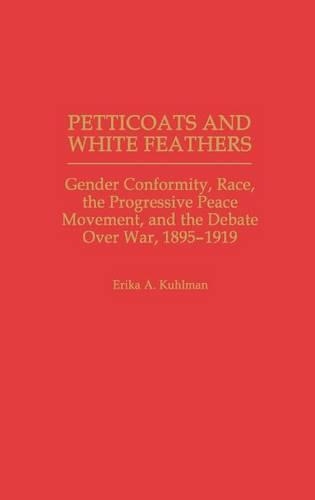
Petticoats and White Feathers: Gender Conformity, Race, the Progressive Peace Movement, and the Debate Over War, 1895-1919
(Hardback)
Publishing Details
Petticoats and White Feathers: Gender Conformity, Race, the Progressive Peace Movement, and the Debate Over War, 1895-1919
By (Author) Erika Kuhlman
Bloomsbury Publishing PLC
Praeger Publishers Inc
30th September 1997
United States
Classifications
Tertiary Education
Non Fiction
European history
First World War
Peace studies and conflict resolution
Warfare and defence
Politics and government
940.3162
Physical Properties
Hardback
160
Description
Kuhlman explores the reasons so many antiwar progressive reformers ended up forming the most vocal faction favoring U.S. intervention in World War I. She argues that conceptualizations of gender and their relations to militarism, democracy, and citizenship were central to creating support for war. U.S. intervention in World War I occurred in an historical context of widespread anxiety about masculine identity produced by the suffrage movement and highlighted by the election of suffragist Jeannette Rankin, the only woman present in Congress during the debate over President Wilson's War Message. The progressive peace movementwhich had reached its zenith of popularity in the U.S. on the eve of interventionexperienced similar disruption as women formed their own pacifist organization. Kuhlman explores the reasons so many progressive lawmakers and pacifists ended up forming the most vocal faction in favor of war. Concepts of femininity and masculinity and their relations to militarism, democracy, and citizenship were central to creating support for war. Initially opposed to military intervention, most male progressive pacifists came to view war as an opportunity to reinvigorate the nation's sagging manhood and nationhood. Some suffragists supported war because they saw war relief work as a way to prove themselves manly enough to withstand the rigors of citizenship during war, and therefore worthy of the vote. After the U.S. declared war, however, New York City feminists' critique of militarism undermined the unity of the progressives' support for war. The New Yorkers' type of feminism, which was based on the linked oppressions of racism, class bias, and sexism, differed from other feminist arguments based on women's moral difference from men. An important study to scholars and researchers of American progressivism, pacifism, and feminism.
Reviews
Kuhlman has made a good beginning on a difficult argument. Her writing is consistently clear.-The Journal of American History
"Kuhlman has made a good beginning on a difficult argument. Her writing is consistently clear."-The Journal of American History
Author Bio
ERIKA A. KUHLMAN is Visiting Assistant Professor of History, Idaho State University. Her main area of research has been the American peace movement.
